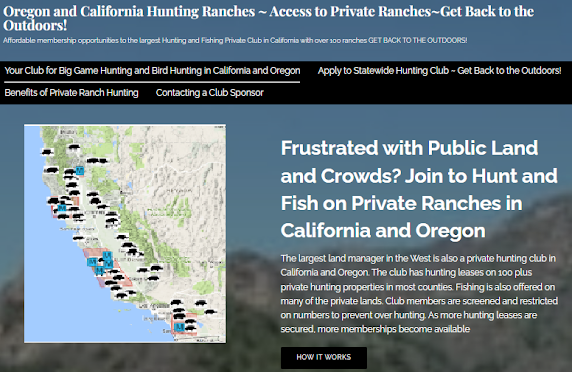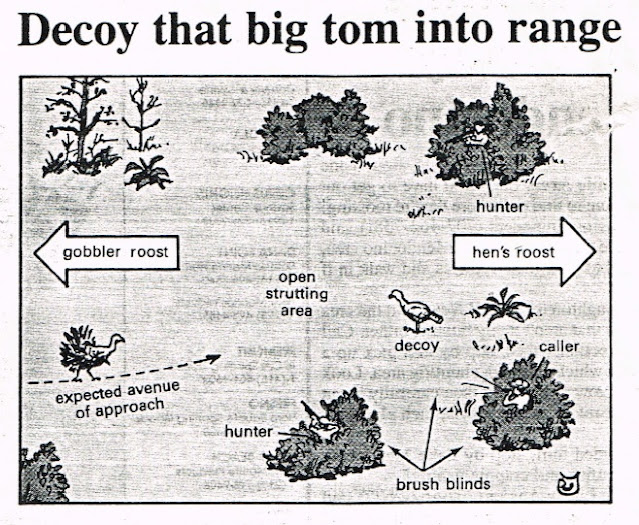How to Hunt Turkeys: Decoy, Call and Understand Turkey Behavior for Hunting in California, Oregon
Here you get access to our giant free hunting and fishing Map site, with how to fish and where to fish or hunt these Public lands. Get access to Hunting Clubs and Private ranches for fishing and hunting. Always free with no strings attached to help preserve our Outdoor Heritage.
Click on a County for California or Oregon Hunting or fishing on Public Lands, Hunting Clubs and Private Hunting Ranches
everything......see "Archived
Blogs" to the right to see more
Talk about your Angry Bird!
How to Hunt Turkeys: Decoy, Call and Understand Turkey Behavior in California and Oregon...
First, a couple interesting Maps (we are a little map crazy around here)
Historical Turkey Range:
Current Turkey Range (2019)
Wild Turkeys were almost extinct in the USA (down to 500 birds) at one time...talk about a come back!
PART I
When stalking and calling turkeys it's wise to note their behavior. There are tell-tale signs they display in their body movements and physiological changes.
- If you notice these you'll have a more successful hunt
THE STRUT
- Does a grossly exaggerated walk "the strut"
- He has heard your call or seen your decoy and
- Means he is very interested in mating or finding a mate
- He comes straight in, no problem keep clucking
- IF he suddenly stops just out of range- he is suspicious- DESIST your calling, he senses you're so excited, he decided to wait for you
- He will then approach closer, so stay quiet, literally don't even blink
HEAD AND NECK SKIN DISCOLORATION
No kidding it goes from bluish-white (calm) to deep red (he's worried or mad) depending on his mood
- If if he stops and his head turns red he is suspicious
- If you see this you better take your shot
INFLATION OF THE SNOOD (turkey’s nose area fleshy droopy tissue is the "snood")
- Contracts and expands depending on whether he is calm or confused
- Starts to contract better start worry hew sees you
- Contracts all the way up past his beak take your shot
HEN'S BEHAVIOR TO DOMINANT MALES, HUMANS CAN ONLY WISH
- Upon encountering a male, Hens will lay down and submissively face away
- Human Males appreciate this behavior in females, saying, in part, "I only wish...."
PART II Calling and Decoys (see below):
PART II Turkey Calling and Using Turkey Decoys
Could you take a break and SUPPORT OUR 120 INFO BLOGS A network of 50+ Hunting clubs and large ranches with family camping. Some fishing farm ponds and trophy fly only trout. Screened membership for safety. Available statewide for $100 to $200 per month when openings available-They have a screened membership and have not had a hunting accident in two decades of operation
Click on Image for more info
HOW TO DECOY TURKEYS
Spring
gobblers have supernatural vision. They don't have eyes, they have
dual 400-power spotting scopes Turkeys also seem to know your human
form better than your own mother knows it, and can pick you out of
indecently heavy cover. What’s needed is something to divert the
gobbler’s attention from your position while he approaches the sound of
your call. Decoys are about the greatest boon to spring tur- key
hunting since the box call.
Decoys
preform two important functions They are atractors: once you have
called a gobbler into view of that decoy, he will fall instantly in
obsessive, possessive love with that decoy. The decoy really brings in
the toms close.
With a
decoy, gobblers frequently hang up and get reluctant at 50 to 100
yards out After all, they are used to having the hens come to them.
Decoys bring them in close — close enough to get right on top of that
deke! Decoys also divert attention away from the hunters; when he's
looking at the decoy, he can’t be looking at you. That really takes a
lot of the pressure off.
Here are a few tips from turkey guides on decoying spring gobblers in the North State:
1. Place the deke in a clearing, with good brush cover for the hunters behind it
Make
sure there is a good clear field of vision of 100 yards or so along
the avenue from which the gobblers are most likely to approach. The
sooner they spot your decoy, the better.
2. Place the caller a bit off to the side from the decoy, not directly behind
3. Place the hunter on the flanks of the caller, so they don‘t have to move much to get a likely shot.
Start
calling when you are set up in your blind — but stop calling once
that tom sees that lane. He‘ll take it from there. Only if he loses
interest should you use a soft coaxer. I The best dekes have their
necks down, not up. Down necks on a hen communicate a kind of
submissive, come-hither sex message. Heads up mean danger - look out.
Make
sure hunters wear full camo, keep still and sit in position with
shotguns resting roughly in the direction you expect the birds to be
coming from. Plot a shot grid around the deke so you know your range.
It’s easy to get excited about a 70-yard shot that looks like 40 yards
Pace off some distances so you know your shot grid. Use these
decoying tactics in your favorite turkey hunting area and you’l1
score! Try Shasta, Tehama, Butte, Yuba, Nevada, Placer, El Dorado,
Mendocino and Monterey counties!
Scroll down after viewing our access to 100+ ranches, and our Map site with hundreds of Maps...
Click on a county for OREGON or CALIFORNIA Hunting Clubs & Private Ranches:
AMADOR
MERCED
YUBA
HUNTING CLUBS &RANCHES SITE
Click on a county for OREGON Hunting Clubs & Private
Ranches:
HUNTING FISH
HUNTING FISH
HUNTING FISH
HARNEY
HUNTING FISH
HOOD HUNTING
FISHING
HUNTING FISH
HUNTING FISH
HUNTING FISH
HUNTING FISH
HUNTING FISH
HUNTING FISH
HUNTING FISH
Here are links to our home pages to Free Hunting and fishing Maps site and to our County by County Public Lands, Hunting Clubs, and Private Ranch fishing and hunting info.:
| AMADOR | ||||
| MERCED | ||||
| YUBA | HUNTING CLUBS &RANCHES SITE |
Click on a county for OREGON Hunting Clubs & Private
Ranches:
|
HUNTING FISH
|
HUNTING FISH
|
HUNTING FISH
|
HARNEY
HUNTING FISH
|
HOOD HUNTING
FISHING
|
|
HUNTING FISH
|
HUNTING FISH
|
HUNTING FISH
|
HUNTING FISH
|
HUNTING FISH
|
HUNTING FISH
|
HUNTING FISH
|











